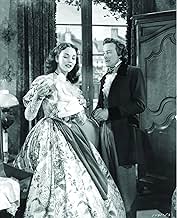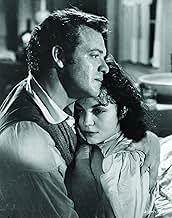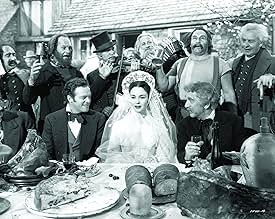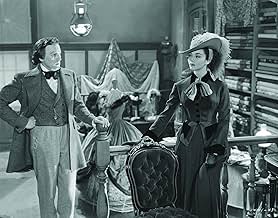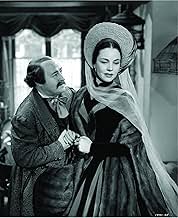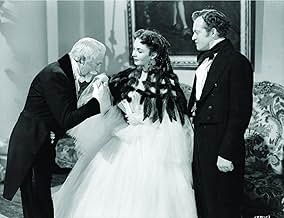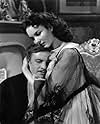CALIFICACIÓN DE IMDb
7.0/10
3.1 k
TU CALIFICACIÓN
Agrega una trama en tu idiomaA provincial doctor's wife's romantic illusions about life and social status lead her to betray her naive husband, take on lovers, and run up ruinous debts.A provincial doctor's wife's romantic illusions about life and social status lead her to betray her naive husband, take on lovers, and run up ruinous debts.A provincial doctor's wife's romantic illusions about life and social status lead her to betray her naive husband, take on lovers, and run up ruinous debts.
- Dirección
- Guionistas
- Elenco
- Nominado a 1 premio Óscar
- 2 premios ganados y 1 nominación en total
Alf Kjellin
- Leon Dupuis
- (as Christopher Kent)
Harry Morgan
- Hyppolite
- (as Henry Morgan)
- Dirección
- Guionistas
- Todo el elenco y el equipo
- Producción, taquilla y más en IMDbPro
Opiniones destacadas
Films of great novels are usually light years away in terms of quality from their originals. There are of course a few exceptions, the David Lean Dickens adaptations for instance and recently a Neil Jordan version of Graham Greene's "The End of the Affair" that I much admired. Generally it is second rate literature, "Gone WIth the Wind" a prime example, that fares so much better. Flaubert's "Madame Bovary" has continued through the history and development of cinema and TV to exert its fascination on would-be translators, although it has to be admitted that it has generally proved elusive. One would have thought that it would have fared particularly well in the hands of outstanding French directors such as Renoir and Chabrol but their efforts to come to grips with Flaubert's masterpiece have ultimately to be judged as among their lesser works. There is quite a lot going for Jean Renoir's early 1933 version, not least the authentic Normandy exteriors shot with great affection, but technically the film shows its age. It is rather like a series of tableaux, some in themselves quite well done, but ultimately lacking a strong narrative thrust and sense of cohesion. Nevertheless I remember being more impressed with it than with Claude Chabrol's 1991 version which I found surprisingly cold and passionless. I admit I have only seen this once and my memory of it is far from clear, perhaps because it grabbed me so little at the time. It may seem rather preposterous to award the accolade for the best "Bovary" to Vincente Minnelli's Americanised 1949 MGM version with its studio mock-up of a French village that seems more of a Flanders lookalike and some location work clearly done in Californian woodland, but, in the absence of so little competition, I would have to plump for it as being certainly the most enjoyable. After all it has that quite exquisite beauty, Jennifer Jones, as the eponymous heroine, suffering and eventually dying as tenderly as only she can. My favourite memory from the film is her first appearance on the farm where Doctor Bovary is calling to tend to her sick father. There she is in a setting of all too believable rural squalor decked out in the most unbelievably opulent dress imaginable. If nothing else it makes Bovary's initial besottedness with her absolutely credible. Minnelli's is a rather sanitised adaptation. Okay to have the heroine die beautifully once the initial agony of taking poison has been established, but the inevitable outcome of a botched operation on a villager's clubfoot - amputation - is, unlike in the novel and other versions, evaded by the doctor's refusal to take on the medical challenge. It makes for rather more comfortable box-office. There are some beautifully done scenes including the almost obligatory inclusion in a Hollywood period piece of a ballroom sequence. The one here has the hedonistic movement that is everything we had come to expect from "The Great Waltz" onwards. There is also the heroine's wait, her bags fully packed in a windswept street after dark for the lover that never comes. Wyler did it rather better in "The Heiress" but Minnelli's has plenty of atmosphere. His version may be even further than its competitors from Flaubert's "Madame Bovary" but he invests it with enough passion and commitment to ensure it a small place in Hollywood history.
Though I'm sure that the various French dramatizations of Madame Bovary are probably superior to this film, this English language version that MGM did in 1949 is as good as any we would have gotten from Hollywood. of that era. Jennifer Jones, Van Heflin, Louis Jourdan, and James Mason were unfortunately hampered by the Code in this version.
MGM's version incorporates the author right into his story. James Mason plays Gustave Flaubert and the film opens with him on trial for authoring indecent material as the French censors of the day saw Madame Bovary. While on the witness stand defending his work, he tells the story of his creation Emma Bovary, a girl with silly romantic notions who brings tragedy all around because of them.
Jennifer Jones is Emma and imagine Bernadette Soubirous who instead of having a divine experience has the misfortune to have other things peak her interest as an adolescent. She reads a whole lot of romantic novels who give her exaggerated notions about the nature of love.
She lives in a pretty dull town in Normandy which was also where Flaubert himself hailed from and which he satirizes in acid in this work. She marries solid, dependable Van Heflin who's a doctor and who she hopes will give her a better life.
It's in Heflin's character that the Code watered down what Flaubert was trying to say. Here he's an upright guy, a lot on the dull side, but dependable. In the novel he's as much desiring of social climbing as Jones is. In fact in the film he refuses to perform an operation that might gain him fame and success because he knows he's not qualified to do it. In the novel he does the operation and it ends in disaster all around.
Jones takes lovers Louis Jourdan and Alf Kjellin and runs up bills that put Heflin into financial disaster. All the while refusing to face the truth about life and herself.
Given the Code restrictions director Vincente Minnelli does as best as he can with his cast. James Mason makes a brilliant and erudite Flaubert on the stand. But considering he was on trial for indecency by not showing the alleged indecency to the fullest the Code defeated what could have been a classic.
MGM's version incorporates the author right into his story. James Mason plays Gustave Flaubert and the film opens with him on trial for authoring indecent material as the French censors of the day saw Madame Bovary. While on the witness stand defending his work, he tells the story of his creation Emma Bovary, a girl with silly romantic notions who brings tragedy all around because of them.
Jennifer Jones is Emma and imagine Bernadette Soubirous who instead of having a divine experience has the misfortune to have other things peak her interest as an adolescent. She reads a whole lot of romantic novels who give her exaggerated notions about the nature of love.
She lives in a pretty dull town in Normandy which was also where Flaubert himself hailed from and which he satirizes in acid in this work. She marries solid, dependable Van Heflin who's a doctor and who she hopes will give her a better life.
It's in Heflin's character that the Code watered down what Flaubert was trying to say. Here he's an upright guy, a lot on the dull side, but dependable. In the novel he's as much desiring of social climbing as Jones is. In fact in the film he refuses to perform an operation that might gain him fame and success because he knows he's not qualified to do it. In the novel he does the operation and it ends in disaster all around.
Jones takes lovers Louis Jourdan and Alf Kjellin and runs up bills that put Heflin into financial disaster. All the while refusing to face the truth about life and herself.
Given the Code restrictions director Vincente Minnelli does as best as he can with his cast. James Mason makes a brilliant and erudite Flaubert on the stand. But considering he was on trial for indecency by not showing the alleged indecency to the fullest the Code defeated what could have been a classic.
This MGM film sure sports a terrific cast--Jennifer Jones, James Mason, Van Heflin and Louis Jordan! However, no matter how good the cast and production values are, this is a film that was very, very difficult to produce in 1940s Hollywood due to the restrictions of the Production Code. This code precluded the film from fully realizing Flaubert's novel, as frank discussions of sexuality were not possible--the film never would have been cleared for public exhibition. So, the studio softened it here and there--and reduced the impact any film about this book could have had. I am sure a more modern version of the book would be quite a bit different--ad Madame Bovary's infidelities been a lot less vague.
The film begins with Dr. Bovary coming to Emma's home to treat her father. The Doctor is quite taken by her and eventually marries her--making her Madame Bovary. While quite pretty, there are some serious warning signs that went unnoticed. First, Emma was a bit childish and lived in a fantasy-sort of world where she expected real life to be like a romance novel! As a result, she's ill-equipped to deal with the boredom that comes with everyday life--as she expects constant passion, excitement and variety--not knowing even the rich and powerful live that way! Second, there is a huge disparity between the head in the clouds Emma and her rather nice but bland husband. He cannot possibly live up to her ridiculously high expectations of a man--and soon she goes searching for excitement on her own. Not surprisingly, she gravitates towards affairs, though in time, these, too, are unsatisfying--even lovers cannot always create excitement and distractions. Eventually, this leads to disaster and the story ends.
Not surprisingly, many story elements have been omitted--some due to the code and some due to the confines of a full-length film. For example, the Doctor's first marriage and significant periods in Emma's life are absent--though the spirit of the book is mostly intact.
While not exactly intended, the film seems to be an interesting portrait of what we might now consider to be a Borderline Personality or at least a person with strong Borderline traits. The inability to cope with boredom, interpersonal shallowness, the tendency to self-sabotage and craving for excitement and addiction (in this case, sexual and spending addiction) are all important hallmarks of this disorder. Such classifications were unknown in Flaubert's time, though he clearly seems to be describing such a person in Emma Bovary.
There is only one problem with such a portrait, however. Emma Bovary is in no way sympathetic--she is selfish, vain and pretty stupid. And, to make things worse, her husband is an utter fool as well, as he willfully ignores his wife's 'excesses'. As a result, it's a lovely movie to watch (it is a very glossy MGM production) but its also detached and hard to love...much like Madame Bovary herself!
The film begins with Dr. Bovary coming to Emma's home to treat her father. The Doctor is quite taken by her and eventually marries her--making her Madame Bovary. While quite pretty, there are some serious warning signs that went unnoticed. First, Emma was a bit childish and lived in a fantasy-sort of world where she expected real life to be like a romance novel! As a result, she's ill-equipped to deal with the boredom that comes with everyday life--as she expects constant passion, excitement and variety--not knowing even the rich and powerful live that way! Second, there is a huge disparity between the head in the clouds Emma and her rather nice but bland husband. He cannot possibly live up to her ridiculously high expectations of a man--and soon she goes searching for excitement on her own. Not surprisingly, she gravitates towards affairs, though in time, these, too, are unsatisfying--even lovers cannot always create excitement and distractions. Eventually, this leads to disaster and the story ends.
Not surprisingly, many story elements have been omitted--some due to the code and some due to the confines of a full-length film. For example, the Doctor's first marriage and significant periods in Emma's life are absent--though the spirit of the book is mostly intact.
While not exactly intended, the film seems to be an interesting portrait of what we might now consider to be a Borderline Personality or at least a person with strong Borderline traits. The inability to cope with boredom, interpersonal shallowness, the tendency to self-sabotage and craving for excitement and addiction (in this case, sexual and spending addiction) are all important hallmarks of this disorder. Such classifications were unknown in Flaubert's time, though he clearly seems to be describing such a person in Emma Bovary.
There is only one problem with such a portrait, however. Emma Bovary is in no way sympathetic--she is selfish, vain and pretty stupid. And, to make things worse, her husband is an utter fool as well, as he willfully ignores his wife's 'excesses'. As a result, it's a lovely movie to watch (it is a very glossy MGM production) but its also detached and hard to love...much like Madame Bovary herself!
Film opens at Flaubert's (Mason) 1857 trial for obscenity in France. After the prosecution finishes its' case, Flaubert answers; his answer frames a flashback to Emma Bovary's (Jones) story.
She grows up on an isolated farm, and is further isolated by her convent education. She grows up believing and fantasizing about love and romance, and that they happen in real life as in fiction. When Dr. Bovary (Heflin) comes to treat her fathers' broken leg, she sees him as her Prince Charming and falls in love with him. After the two marry, they go to the village in Normandy where Charles lives. .
Jones is extraordinary as Madame Bovary. She hits all the right notes as a girl who can't/doesn't separate fantasy from reality. She is marvelously subtle as a woman who switches from role to role in her fantasy life, and doesn't let reality intrude until it's too late. She at least deserved a Best Actress nomination from the Academy.
Van Heflin is good if overemphatic and too American as Emma's husband. Louis Jourdan is just about perfect as Emma's seducer who literally sweeps her off her feet. James Mason is fine as Flaubert.
Miklos Rozsa contributed a fine score, with especially notable music for the ball scene. Vincent Minnelli's direction is subtle. This is a very good film for a tearjerker. Jones and Minnelli are at their best.
She grows up on an isolated farm, and is further isolated by her convent education. She grows up believing and fantasizing about love and romance, and that they happen in real life as in fiction. When Dr. Bovary (Heflin) comes to treat her fathers' broken leg, she sees him as her Prince Charming and falls in love with him. After the two marry, they go to the village in Normandy where Charles lives. .
Jones is extraordinary as Madame Bovary. She hits all the right notes as a girl who can't/doesn't separate fantasy from reality. She is marvelously subtle as a woman who switches from role to role in her fantasy life, and doesn't let reality intrude until it's too late. She at least deserved a Best Actress nomination from the Academy.
Van Heflin is good if overemphatic and too American as Emma's husband. Louis Jourdan is just about perfect as Emma's seducer who literally sweeps her off her feet. James Mason is fine as Flaubert.
Miklos Rozsa contributed a fine score, with especially notable music for the ball scene. Vincent Minnelli's direction is subtle. This is a very good film for a tearjerker. Jones and Minnelli are at their best.
Jennifer Jones was a star I knew well from visits to the cinema with my family during the 1950's: "The Man in the Grey Flannel Suit", "The Barretts of Whimpole Street", "Love is a Many Splendored Thing" and "A Farewell to Arms".
I cut in on her at a certain stage in her career. She was a bit older than my mum, and although I liked her she didn't have the effect on a prepubescent lad that Yvette Mimieux or Tuesday Weld were having.
It wasn't until later, when we got television, that I saw the movies she made earlier in her career; "Song of Bernadette, "Duel in the Sun", "Portrait of Jennie", "Carrie" and this one: Vincente Minnelli's "Madame Bovary". What an absolute stunner she was.
Emma Bovary (Jennifer Jones) is the beautiful daughter of a poor French family, but she has an overactive imagination fostered by romantic novels.
She marries a country doctor Charles Bovary (Van Heflin) who she doesn't really love hoping to advance her standing in society and pursue her romantic dreams. However she soon outspends her husband's capacity to earn. In an era before credit cards, she maxes-out on credit notes.
Emma attracts men like moths to a flame, and cheats on her husband who still loves her despite everything. There are tears before the final fade out.
The film is bookended with the trial of Gustave Flaubert who wrote the original novel. Apparently the story so outraged the French hierarchy that they took old Gustave to court. He got off and of course the book became a bestseller.
The filmmakers used the trial to allow Gustave (James Mason) to narrate the story - quoting passages of Flaubert's prose. Although narration can be a lazy device in film, in this case, Mason's mellifluous voice puts us in the picture quickly. More importantly, Emma is seen sympathetically despite being hopelessly self-focused.
Two actors added the final touch of class to the 1949 version. Van Heflin is such a nice guy here that we are waiting for someone to smack Emma to her senses. Louis Jordan gives another variation on that smooth roué he played in "Letter to an Unknown Woman" - a not dissimilar drama.
Composer Miklos Rozsa surpassed himself with the score. With its beautiful main theme for Emma and flowing melodies it sweeps you along.
A 2014 version did away with narration. It's more low-key, but quite good with a totally different vibe to the Minnelli version. It was filmed in France and is more explicit with a fair bit of nudity. Jennifer Jones was fortunate that her movie career was in an era where she didn't have to worry about getting in shape for that kind of thing.
I cut in on her at a certain stage in her career. She was a bit older than my mum, and although I liked her she didn't have the effect on a prepubescent lad that Yvette Mimieux or Tuesday Weld were having.
It wasn't until later, when we got television, that I saw the movies she made earlier in her career; "Song of Bernadette, "Duel in the Sun", "Portrait of Jennie", "Carrie" and this one: Vincente Minnelli's "Madame Bovary". What an absolute stunner she was.
Emma Bovary (Jennifer Jones) is the beautiful daughter of a poor French family, but she has an overactive imagination fostered by romantic novels.
She marries a country doctor Charles Bovary (Van Heflin) who she doesn't really love hoping to advance her standing in society and pursue her romantic dreams. However she soon outspends her husband's capacity to earn. In an era before credit cards, she maxes-out on credit notes.
Emma attracts men like moths to a flame, and cheats on her husband who still loves her despite everything. There are tears before the final fade out.
The film is bookended with the trial of Gustave Flaubert who wrote the original novel. Apparently the story so outraged the French hierarchy that they took old Gustave to court. He got off and of course the book became a bestseller.
The filmmakers used the trial to allow Gustave (James Mason) to narrate the story - quoting passages of Flaubert's prose. Although narration can be a lazy device in film, in this case, Mason's mellifluous voice puts us in the picture quickly. More importantly, Emma is seen sympathetically despite being hopelessly self-focused.
Two actors added the final touch of class to the 1949 version. Van Heflin is such a nice guy here that we are waiting for someone to smack Emma to her senses. Louis Jordan gives another variation on that smooth roué he played in "Letter to an Unknown Woman" - a not dissimilar drama.
Composer Miklos Rozsa surpassed himself with the score. With its beautiful main theme for Emma and flowing melodies it sweeps you along.
A 2014 version did away with narration. It's more low-key, but quite good with a totally different vibe to the Minnelli version. It was filmed in France and is more explicit with a fair bit of nudity. Jennifer Jones was fortunate that her movie career was in an era where she didn't have to worry about getting in shape for that kind of thing.
¿Sabías que…?
- TriviaAfter the expensive box-office failure of El pirata (1948), director Vincente Minnelli worked hard to cut corners on this film, fearing he might be accused of extravagance. However, he devoted a great deal of time to the ball sequence, which he regarded as the most important scene in the film; he even had composer Miklós Rózsa compose the waltz theme used in it well in advance of the start of filming.
- ErroresWhen Madame Bovary asks Leon for money, he reacts by punching out one of the glass window panes. But on the next cut, the previously shattered window pane is now intact.
- Citas
Emma Bovary: Do you know, Charles, why that clock strikes? To announce the death of another hour.
- Versiones alternativasAlso shown in a computer colorized version.
- ConexionesFeatured in Some of the Best: Twenty-Five Years of Motion Picture Leadership (1949)
Selecciones populares
Inicia sesión para calificar y agrega a la lista de videos para obtener recomendaciones personalizadas
Everything New on HBO Max in August
Everything New on HBO Max in August
Looking for something different to add to your Watchlist? Take a peek at what movies and TV shows are coming to HBO Max this month.
- How long is Madame Bovary?Con tecnología de Alexa
Detalles
- Fecha de lanzamiento
- País de origen
- Sitio oficial
- Idioma
- También se conoce como
- Madame Bovary
- Locaciones de filmación
- Productora
- Ver más créditos de la compañía en IMDbPro
- Tiempo de ejecución1 hora 54 minutos
- Color
- Relación de aspecto
- 1.37 : 1
Contribuir a esta página
Sugiere una edición o agrega el contenido que falta


